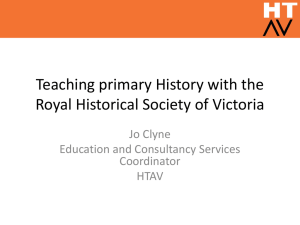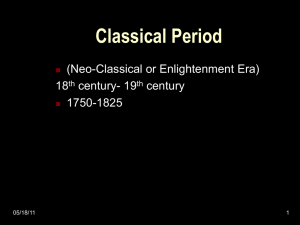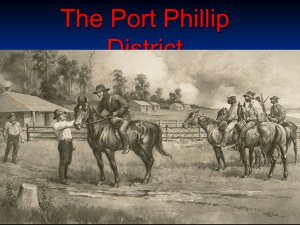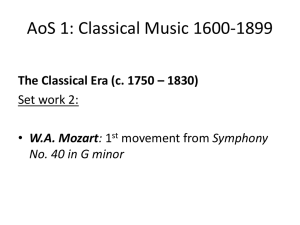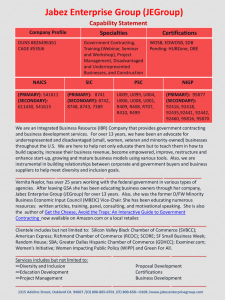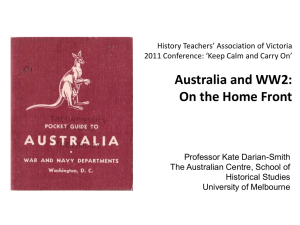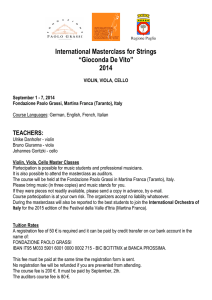Qualitative Evaluation of Program Outcomes
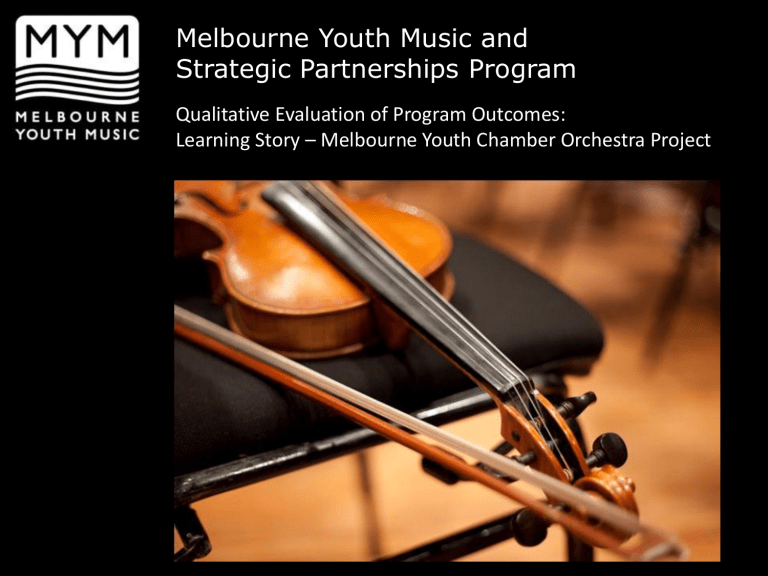
Melbourne Youth Music and
Strategic Partnerships Program
Qualitative Evaluation of Program Outcomes:
Learning Story – Melbourne Youth Chamber Orchestra Project
Qualitative Evaluation of Program Outcomes:
Learning Story – Melbourne Youth Chamber Orchestra Project
Summary:
Over the April Easter weekend 2010, Melbourne Youth Music conducted an intensive 5 day program that saw 30 of Melbourne Youth Orchestra’s advanced string players combine in a Chamber Orchestra under the leadership of some of Australia’s leading exponents of string playing
(biographies attached).
Rehearsals were conducted in a collaborative style, with mentors discussing musicianship and technique as well as leading their sections through rehearsals and tutorials on a selection of rewarding repertoire.
The project culminated with a public performance at St John’s Church,
Southbank on Easter Monday.
Qualitative Evaluation of Program Outcomes:
Learning Story – Melbourne Youth Chamber Orchestra Project
Violist Doreen Ooi & Mentor Christopher Moore
Qualitative Evaluation of Program Outcomes:
Learning Story – Melbourne Youth Chamber Orchestra Project
Purpose:
This new Melbourne Youth Music initiative focused on developing a high level of chamber music skill under the mentorship of some of Australia’s leading exponents of orchestral performance.
Learning Outcomes:
• Improved musical & historical understanding
• Ensemble skills
• Performance skills
• Increased respect for colleagues and the rehearsal process
Qualitative Evaluation of Program Outcomes:
Learning Story – Melbourne Youth Chamber Orchestra Project
Learning Outcomes: Musical & historical understanding
Members’ commented that their level of understanding of the elements of music were improved and developed. The elements included:
• Compositional Structure
• Tonality
• Texture
• Timbre
• Harmony
•
•
•
•
•
Melody
Metre
Rhythm
Articulation
Dynamics
The historical context of the music they performed was improved and developed, as was their understanding of the relationship between history
/ context and composers’ treatment of the elements of music.
Qualitative Evaluation of Program Outcomes:
Learning Story – Melbourne Youth Chamber Orchestra Project
Learning Outcomes: Ensemble skills
Chamber Orchestra members developed and improved their ensemble skills – which differentiate from perfecting one’s part individually.
Ensemble skills include:
• Playing together within their section
• Blending to create a unified timbre within their section
• Playing together as a section with the rest of the orchestra
• Deciding when and how to play based on listening, looking, and ‘feeling’ the right thing to do - which relies mostly on developing a trust in their own instincts
• Avoiding the large-ensemble dangers of rushing, dragging, ignorance of dynamic contrasts, and rhythmic abbreviation
• Understanding specific roles within a texture, and making sound musical decisions so as not to overshadow, overplay, or overcompensate.
When all these skills are working well, the result is an ensemble of players within which spontaneous interaction is possible. Through the Mentors, members were encouraged to strive for these ideals.
Qualitative Evaluation of Program Outcomes:
Learning Story – Melbourne Youth Chamber Orchestra Project
Learning Outcomes: Performance skills
Chamber Orchestra members throughout the program improved and developed their ability to give effective, exciting, accurate, moving, and successful performances. This means:
• knowing how to give the performance their all, and when it may be appropriate to hold back;
• knowing how to manage an adrenalin rush effectively, so it doesn’t impact negatively on performance;
• knowing what is appropriate and inappropriate in terms of stage manner;
• knowing how to approach performances with a positive attitude;
• knowing how to let go and enjoy their performance, letting go of things that have already gone wrong, and saving the self-critique for the next day (rather than suffering it during the performance).
Qualitative Evaluation of Program Outcomes:
Learning Story – Melbourne Youth Chamber Orchestra Project
Learning Outcomes: Respect for rehearsals & colleagues
Chamber Orchestra members improved their relations with professional colleagues and co-members. They developed high-level skills in concentrating attentively in an intensive rehearsal period which mirrors that of the professional world. Their respect for the rehearsal process includes their regular on-time attendance as well as adequately preparing their parts out of respect for their mentors and colleagues.
Qualitative Evaluation of Program Outcomes:
Learning Story – Melbourne Youth Chamber Orchestra Project
Ioana Tache: Violinist
“To start with I was a bit intimidated about working so closely with the mentors”
“My mentor Monica knew the pieces so well, she talked a lot about the history and background of the music”
“It was such an intense rehearsal period, we all had to push ourselves because we knew there was a performance deadline,
I guess it’s just like being a professional, it was good practice”
“I practiced so hard during the week just to try and get a bit closer to the standard of the Mentors, I felt so lucky to be in the room with some of Australia’s best musicians”
“As a Melbourne Youth Orchestra section leader, I learnt a lot by seeing the mentors and how they moved and lead the section by just watching and listening to them – they don’t hold back”
“After working with them I don’t feel so self conscious when I play now, I feel less intimated and more free, during the week
I got more confident to ask questions. It was collaborative, I was involved in discussions and I could make suggestions”
Qualitative Evaluation of Program Outcomes:
Learning Story – Melbourne Youth Chamber Orchestra Project
Ioana Tache: Violinist
“It’s the most detailed rehearsal I’ve ever been in, it was a new experience”
“I think the techniques I learnt I was able to use again in the
MYO Bartok concert in June. When the MYO section leaders performed together again, it felt like we were a tighter group, there was more contact, it was more natural”
“I feel more confident when I lead my section now, I think the other players in my section would notice a difference even if they didn’t play in the Chamber Orchestra”
“It has made me think about music in a different way.
Everything is still in my head, it was so inspirational”
Qualitative Evaluation of Program Outcomes:
Learning Story – Melbourne Youth Chamber Orchestra Project
Learning Outcomes: Expertise achieved by students
At the conclusion of the project, participating students were able to:
• Perform new repertoire to a high standard including allocated solos
• Work together as an ensemble, without the direction of a Conductor
• Confidently lead their section within the ensemble
• Transfer rehearsal techniques learnt to their private practice
• Display renewed enthusiasm for rehearsal and performance
• Apply the historical knowledge of composers studies to similar repertoire
• Pass on skills learnt during the project when rehearsing with the
Melbourne Youth Orchestra
Qualitative Evaluation of Program Outcomes:
Learning Story – Melbourne Youth Chamber Orchestra Project
Challenges:
In order to provide such up close and individual contact for the musicians, only 30 members of the Melbourne Youth Orchestra were selected to take part in this project. It would be beneficial to be able to expand the number of students who are able to take part, however the sense of working so closely with the mentors could be lost.
As a pilot program for 2010, positions were only offered for members of the orchestra who play string instruments.
Next steps:
Based on the Success of the 2010 project, Melbourne Youth Music intends to expand the Chamber Orchestra project in 2011 to also include wind, brass and percussion students.
Qualitative Evaluation of Program Outcomes:
Learning Story – Melbourne Youth Chamber Orchestra Project
MYM’s Chamber Orchestra in performance at St Johns Lutheran Church, Southgate
